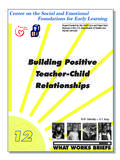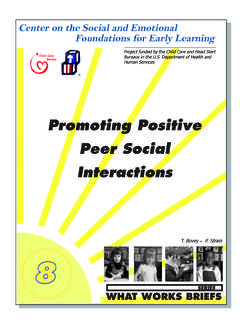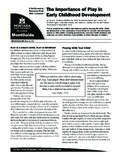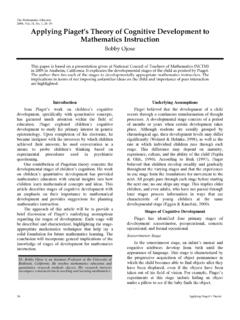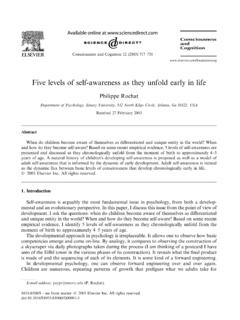Transcription of The Social emoTional Development of Young children
1 The Social emoTional Development of Young children ResouRce Guide foR HealtHy staRt staffSocial emoTional develop -ment is a fundamental part of a child s overall health and well-being, as it both reflects and impacts upon the develop -ing brain s wiring and function. Social emoTional Development is sometimes called early child-hood mental health or infant mental health. It spans from how children interact with others to how they manage or cope with adversity and stress. Social emoTional Development within the first few years of life sets a precedent and prepares children to be self-confident, trusting, empathic, intellectu-ally inquisitive, competent in using language to communi-cate, and capable of relating well to Healthy Social and emoTional Development refers to a child s emerging ability to: Experience, manage, and express the full range of positive and negative emotionsi i; develop close, satisfying relationships with other children and adultsi i i; and Actively explore their environment and learniv.
2 A child s emerging Social and emoTional skills form a critical foundation for learn-ing and wellness that will guide them into adulthood. The healthier a child s early experiences are, the more apt they are to enter school and life with a strong foundation of Social - emoTional skills. It is important to remember that these are the experiences and skills that will influence how they deal with both success and ad-versity across their lifespan. To understand how these early childhood experiences and skills influence life-long trajectories of health and productivity, parents and caregivers need to be aware of three important types of connections that are forming in the first few years of babies are born, parents make a commitment to love, protect and provide for their children . Society expects that parents will do their part to ensure that their children survive, but most parents want more for their children they want them to thrive!
3 In addition to being healthy, most parents want their children to be bright, curious, confident, caring, happy and successful. They might imagine their children taking their first steps, riding bikes, or heading off for their first days of school. They may even wonder how they will adjust to Kindergarten, if will they make new friends in the second grade, whether they will want to try playing a musical instrument, or what sports or hobbies they will enjoy in high school. Will they be shy or the child that everyone wants to have as their friend? Will they think for themselves, or will they follow the pack? Will they make good, healthy decisions and avoid all the trappings of the teenage years (like substance abuse, promiscuity, depression or violence), or will they lack the resilience and vision needed to see them through childhood, adolescence, and into adulthood? Although a bit overwhelming at times, all of these are normal thoughts and concerns for new parents as they look upon their new child and begin to wonder how their child will learn and grow under their care.
4 What parents may not realize is that many of these hopes and fears are related to their child s Social and emoTional Development . WhaT iS Social emoTional Development anD WhY iS iT imporTanT?1At birth, an average newborn s brain has about 1 billion nerve cells, or neurons, and weighs about a pound. By three years, the average brain still has about 1 billion neurons, but it now weighs three pounds! The difference is due to more support cells (called glia) and an explosion in the number of connections between the neurons, called synapses. These new connections are forming at an astronomi-cal rate several hundred per second! Whether these connections are saved into adulthood or pruned during childhood depends upon whether they are actually used or activated, and their activation is often dependent upon the child s experi-ence with the environment. To put it simply, the more enriching or stimulating the child s environment, the more connec-tions are strengthened and maintained.
5 This brain plasticity (the ability of the brain to literally alter its connections to adapt to its surroundings), however, is a double edged sword: are the connec-tions underlying self-regulation, Social skills, and speech being activated and strengthened, or is the environment un-intentionally activating and strengthening the connections underlying fear, anxiety, aggression or hopelessness? Perhaps even more importantly, this brain plasticity is a limited time offer: as the child grows, brain plasticity declines, and the effort needed to form new connections increases. In sum, parents need to understand that a Young child s experience with the environment literally sculpts the connections that are forming within the child s brain, and that this initial wiring is critical because making new brain connections gets much harder as we connecTionS parT i: UnDerSTanDing Brain DevelopmenT2making connecTionS parT ii: UnDerSTanDing Social emoTional Development During the first few years of life, no aspect of the child s environment is more important for proper brain Development than his or her connections with oth-ers.
6 Sometimes called attachment, the bonds Young children form with parents and caregivers are critical. Early nurtur-ing relationships teach children how to become calm after stressful events, be it hunger, frustration with their unsuccess-ful attempts to express themselves, or scraping their knee. This ability to regulate strong emotions, initially with the help of others and eventually by one s self, is a critical skill. Regulating strong emotions is necessary for age-appropriate behavior. On the other hand, the inability to turn off the body s stress response can disrupt the neuronal connections that are form-ing within important areas of the brain, including those responsible for learning, memory and planning. Nurturing and supportive Social connections early in life promote healthy emoTional regulation, and that allows for optimal brain develop -ment and function. Conversely, excessive or prolonged stress in absence of Social supports activates and strengthens the neuronal connections underlying the stress response, setting up a brain that is wired more for stress and survival and less for learning and reason early Social connections are so important is that most of what Young children learn occurs within the context of a relationship, beginning with the Social smile and continuing on through babbling, walking, speaking, understand-ing and eventually enjoying others.
7 Nurturing and responsive Social connec-tions encourage the child to imitate these important elements of healthy develop -ment. As parents and caregivers develop caring, supportive connections with children , they are better able to assist them in developing crucial intellectual, emoTional , and Social abilities. Examples include: learning to give and accept love; being confident and secure; showing em-pathy; being curious and persistent. These are all abilities that will enable their child to learn, to relate well with others, and to lead a happy and productive life. That being said, it is important to remind parents that every child grows and devel-ops differently. Some of these foundation-al skills may come quite easily and will only need to be reinforced with praise, while other skills will need to be purposefully 45making connecTionS parT iii: UnDerSTanDing life coUrSeThe Social and emoTional connections that Young children develop with their caregivers literally helps to determine which neuronal connections are activated and strengthened within their brains, and these early neuronal connections form the foundation for lifelong brain function.
8 This is the biology that underlies the long es-tablished connection between early child-hood experiences and life course. children who have adverse childhood experiences are more likely to have unhealthy and un-productive lives, whereas Young children who have positive, stimulating experiences are more likely to be healthy, to finish school, to remain married, to be gain-fully employed, and to shun violence and substance abuse. In sum, the foundations for lifelong health and productivity begin in childhood and are built upon early Social emoTional , taught and practiced. This is the challenge of purposeful parenting making sure that their child s emerging Social emo-tional and linguistic needs are Met by: Modeling age appropriate Social - emoTional -linguistic behaviors for their child (like smiling, cooing, bab-bling, using words, reading, regulating their own emotions, and demon-strating caring relationships with others not just the child!). If they have nurtured a caring, responsive relationship with the child, the child will want to imitate these behaviors.
9 Encouraging emerging Social -emo-tional-linguistic skills (like smiling, cooing, babbling, using words, regulating strong emotions, read-ing, regulating their emotions, and demonstrating caring relationships with others) to ensure that these important behaviors continue to be used. By catching them being good, or actively encouraging positive behaviors, parents are practicing posi-tive discipline (remember that the word discipline means to teach NOT to punish!). They also are solidifying important basic skills that will serve as the foundation for more complex skills later in life. Teaching and even practicing Social - emoTional -linguistic skills that might be more difficult to master like healthy adaptations to cope with adversity or stress (using words when frustrated or angry, taking turns when learning to share, walking away from conflict, or, as the child ages, solving problems collaboratively).Parents should also be aware of the signs that a child might be in need of additional support to develop these critical Social - emoTional skills.
10 Like when a child: Is more fearful and worried than other children Has sleeping, eating, or toileting problems Displays behavior like hitting, scream-ing, or fighting on a daily basis Treats other children , animals, or objects cruelly or destructively Is not talking or expressing needs Has trouble forming relationships Is unusually quiet, shy, or withdrawn Is unable to play Has trouble with self-control Is hard to soothe or comfort Tends to have frequent headaches or stomach achesIt is important for Healthy Start staff to recognize that different cultures may have various expectations about the age a child achieves certain Social milestones smiling, playing well with other children , sharing, etc. Therefore, be patient with the family and encourage them to be patient with their child, reminding them again that every child grows and develops differently. 67 Healthy Start plays an integral role in helping new parents and parents of Young children become well-informed about their child s Development .



